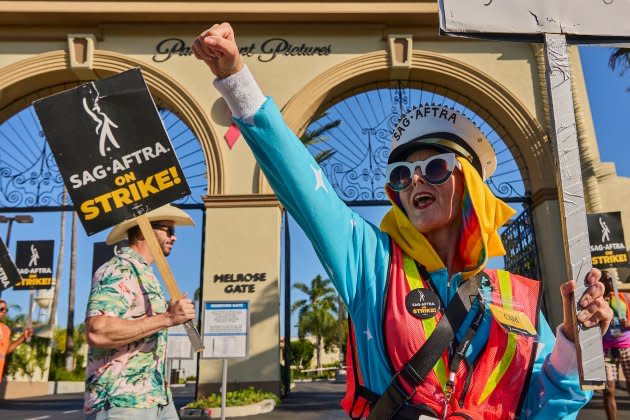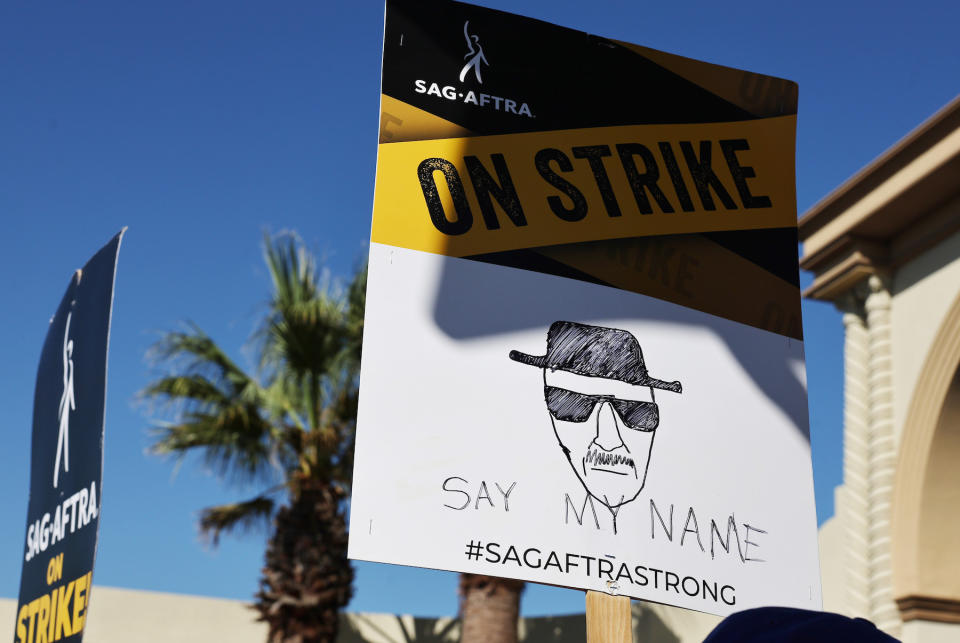The Studios Just Lit a Fire Under Striking Actors: ‘We’re Not Going Anywhere’

It’s been 97 days since members of the Screen Actors Guild went on strike against the Hollywood studios and streamers, demanding a better contract and asking the Alliance of Motion Picture and Television Producers for protections against artificial intelligence as well as an increase in residual payments. As actors near the 100-day mark, they’re disappointed the studios walked away from the negotiating table last week and don’t seem wanting or willing to reach an agreement, allowing the entertainment industry to get back to its regularly scheduled programming.
On Tuesday morning outside of Paramount Studios, SAG-AFTRA members told Rolling Stone they made history; they said this is the longest SAG-AFTRA has ever struck the TV and theatrical agreement, and it’s also the second-longest strike in the union’s history (the longest being the 2000 SAG strike that lasted six months). But this isn’t the kind of history they want to be making.
More from Rolling Stone
Netflix's 'Neon' Captures the Making of a Reggaetonero - This Is the Song That Starts It All
'Headliners Only': Chris Rock and Kevin Hart's Tour Captured for Netflix Documentary
Brendan Bradley, a strike captain at Paramount who’s also been a SAG member for more than 15 years, says he’s frustrated the AMPTP left the negotiating table last week after taking so long to even return to it in the first place. But their actions did also help light a fire under striking actors who’ve showed up to picket across Los Angeles and New York City.
“We’re more empowered and emboldened than ever because we struck for 80 days to get them to return to the table and within a few sessions, they immediately walked up and left that table again,” Bradley explains. “That lack of being able to negotiate in good faith and find middle ground, especially after a week ago, is strange because they just found middle ground on every single key talking point with the Writers Guild. It shows progress can be made, there is a middle ground to be reached, and it’s really odd that our business partners aren’t coming to terms here.”
Bradley says he’s been on the front lines at Paramount for five days a week since the strike began in July, even joining the writers in solidarity when they went on strike in May. According to Bradley, the deal the writers struck with the studios can serve as a “blueprint” for SAG members, but it’s not necessarily a copy-and-paste solution.
“I think the Writers Guild contract provides a nice blueprint for what we might begin conversations around, but we also have a lot of other categories of workers and there’s a lot of other considerations. This is a historic moment. This is an existential moment. We are not leaving without fighting for some sort of victory in every category of worker,” asserts Bradley.

He continues: “I’m exhausted. It’s terrible, nobody wants to be out here. But what I do recognize is the last historic double strike was in the 1960s, and it’s the reason I have health care. It’s the reason I have a pension plan. It’s the reason I have residuals, which have kept me afloat and allowed me to have a career — because others before me stood up for my rights. And so it’s my job to stand up for the next several decades of this industry.”
Miki Yamashita, another strike captain at Paramount Studios, says there was a collective feeling of encouragement among SAG members when the studios came to an agreement with the WGA, which made it all the more disappointing to learn how last week’s meeting went down.
“We felt a sense of momentum that we thought was going to take us right through to our completion of our negotiations, so last Wednesday night when SAG-AFTRA sent us an email saying that talks have broken down and that the AMPTP has walked away from negotiations, that was extremely disappointing,” Yamashita maintains. “I was crestfallen, to be honest with you, because I was truly hoping for an end to the strike and for all of us to be able to get back to work.”
Yamashita agrees with Bradley that the studios may have unintentionally motivated actors who were otherwise feeling tired and drained to get back out on the picket lines and rally. According to the strike captains, they’ve seen a surge in the number of daily picketers at Paramount since last week’s news. They say people are demonstrating even more solidarity in an effort to show “producers that we’re serious and we’re not going to cave.”
“Acting is my passion. I’m committed to it as a career and that’s what this is about, to be able to have a career, to be able to support ourselves with basic wages and working conditions. So that we can have health insurance and we can have a life that doesn’t require us to have 4,000 other jobs,” Yamashita says, explaining that she’s been a member of SAG-AFTRA since 2001. “We love what we do but that labor of love is still labor, and labor always deserves to be compensated.”
For strike captain Ely Henry, the AMPTP’s response to the Screen Actors Guild last week is reflective of the same strategy they used with the writers.
I think that they love a reboot. They love to rehash old ideas. They’re doing exactly what they did to the WGA a month ago. They have a very specific playbook of strike-breaking and, and they want us to be demoralized, they want us to be broken, they want us to be tired.
“I think that they love a reboot. They love to rehash old ideas. They’re doing exactly what they did to the WGA a month ago,” Henry says. “They have a very specific playbook of strike-breaking and, and they want us to be demoralized, they want us to be broken, they want us to be tired. The playbook is to make us feel as tired and broken down and hopeless as possible … I’ve already been emotionally tired for my entire career. I can handle it.”
Despite what he calls a “demoralizing” strategy on behalf of the studios, Henry is confident the actors will follow in the same footsteps as the writers and come out of the strike with a fair contract they’re happy with.
When it comes to their contracts, Henry is hopeful that paid minimums and residuals on streaming shows will increase. While streaming has allowed for a surplus of jobs and opportunities, it’s also fostered an oversaturation of content from entertainment companies that are making so many TV shows and films that they’re not paying people enough to work on them.
“I worked last year more than I’ve worked in my career, and I was really fortunate for it,” shares Henry, explaining that he appeared on more than a handful of TV episodes from streamers. “The fact is, though, that all those things combined paid me just a little bit more than one episode when I’ve been a series regular [on linear TV], and that speaks to the fact that series regulars on streaming shows are paid as little as possible. It’s time to raise the minimum.”
Henry plans to continue picketing every single day in front of Paramount, just like he’s been doing since July, finding community and camaraderie with his fellow actors. They’re unhappy with how the studios are treating these negotiations and they’re tired of picketing, but they won’t stop until they feel like their voices are heard.
“Actors have spent their careers not working for periods of time, and we mostly have other jobs. Some of us are fortunate to not have to have other jobs, and I’m fortunate enough that I don’t have another job besides acting. This is why I’m out here. I can afford to be out here,” Henry says. “We’re all pissed. We’re all sad. We’re all angry. But we’re not going anywhere.”
Best of Rolling Stone
